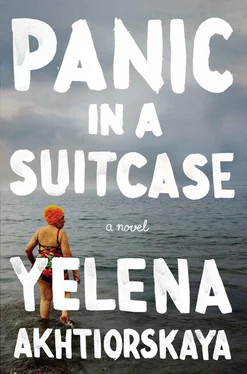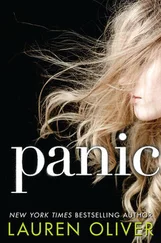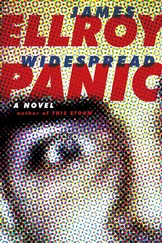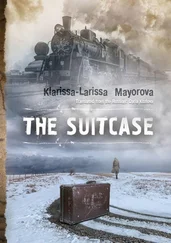By the time his shorts were buttoned — or rather his brother-in-law Levik’s shorts, since Pasha had brought with him for a monthlong visit only one pair (also Levik’s hand-me-downs), onto which he’d immediately tipped the welcoming glass of young Georgian wine — Esther, Pasha’s mother, had packed a suitcase of nourishment (apples, cherries, plums, apricots, or the hard balls of assorted sizes and shades that passed for them in this country), replenishment (bologna sandwiches), stimulant (black tea), reward (poppy-seed rolls), punishment (carrots), and something to pass the time with (sunflower seeds, clothes that needed mending). Habits shouldn’t be allowed to cement — they must be extracted early on, like wisdom teeth. In Odessa, Esther and Robert’s dacha had been a ten-minute walk from the sea, which for reasons that don’t translate was considered a long, arduous journey. If a crucial beach accoutrement was forgotten at home, no one would’ve thought to go back to get it. Decades of this kind of training had instilled a dogged discipline. Now that the ocean was in the front yard of their building, Esther still packed so that nothing would be lacking. The governing rule: There must be surplus, yet nothing should spoil.
At the last moment, Levik decided he’d rather not go — it was Shark Week on the Discovery Channel. Tape it, said Marina. But he was developing a migraine. Wear a cap and take two Advil. Where’s the sunscreen? There’s no sunscreen — what do you think this is, a pharmacy? Well, they wouldn’t be long, just an hour, hour and a half, before the sun got strong. But it’s already a quarter of eleven! Did they still have that umbrella with the green and beige stripes? Maybe it was in the hall closet with the other junk— Are you out of your mind? It ripped ages ago, not to mention flew off with a not-particularly-hearty gust into the Atlantic. Marina peeked into her daughter’s room. Two giant, grimy feet poked out from under a blanket. Frida! she screamed. We’re off to the beach without you!
Esther took this moment to corner her son. Her damp face gave off a postmenopausal odor, like overripe apricot flesh. The sweat never had time to dry. And like flypaper it caught everything it came into contact with — hairs, lint, fruit flies. Pasha, she said, can I ask a tiny favor, please don’t get angry, just try to hear me out, a bit of patience—
Out with it!
Take that thing off.
Oh, not this again.
Just while you’re here — for Frida’s sake.
She’s nine!
But she’s a curious girl. She’ll start asking questions, and next thing you know—
She’s running off to join a convent?
It’s not impossible. She still occasionally makes the sign of the cross over herself.
And that’s my fault?
Where else did she get it?
TV. Classmates. She goes to school by now, I hope.
Is it so much to ask, Pasha? Would it be so difficult?
He looked to the side, as if consulting the couch. He’d thought that the combination of circumstances — the separation, his mother’s condition, the palliative effect of time — would’ve finally rendered this a non-issue. Wishful thinking. His conversion was bound to remain an open wound on the family flesh, susceptible to infection. At twenty he’d inflicted the injury. There had been the technicality of the process — an elaborate theater of spite, as Esther called it, convinced that every step of it was being done to undo her. The catechumen period had been auspiciously brief. The priest practically apologized on God’s behalf, as if Pasha’s soul had ended up in the Yid pile by accident, in a forgetful or clumsy moment. He received the Eucharist like a crying toddler slipped a pacifier. At last spiritually content. He wore a conspicuous though not garish silver crucifix around his neck (later tucked into T-shirts), attended services, believed in creationism, had convincing arguments and logical proofs against Darwin’s theory, which had the quality of withering immediately in the convinced person’s brain and being impossible to paraphrase, and collected icons. The icons weren’t just any old icons, rather they were very old icons, obtained after hours of sifting through junk under the junk owner’s suspicious stare and briny breath, plucked from the heaps of vendors who had no clue they possessed anything of worth and wouldn’t have believed it if you told them. The Soviet Union’s skewed ratio of valuable objects to discerning collectors resulted in Pasha’s acquiring a reputation for clutter. Correction: domestic chaos. Someone was usually around to provide the reproaching. One evening he came home holding a tiny wooden panel with chipped, blackened paint in which he claimed to see the Virgin of Kazan. At least two hundred years old, he said, trembling. Ten kopecks! After months of painstaking restoration, the black lady materialized for everyone to see. Not all instances were so exemplary.
To be sure, Pasha was a far cry from a zealot. The conversion was an appropriation of aesthetic symbols and traditions essential to his craft. Did he not consider, however, that he could appropriate them without the theater, as, for example, Brodsky had? Was it really necessary to believe ? A grand gesture had been in order. Pasha stood too apart, was too achingly himself. Self-consciousness in such extreme potency wouldn’t do for a Russian poet. By joining the Orthodox Church with its hundred million adherents (exact figure?), its seventy-five percent of the Russian population, the fledgling Pasha had been fastening a link that would allow him to roam freely without the danger of floating off into the attic of an ivory tower (reverse gravity being the poet’s hazard). And through this link he’d stave off tendencies inherited from a line of depressives. Father, grandfather, uncles, great-grandfathers — dysthymic men of Literature and Medicine, oblivious to the political and cultural climate, abiding only mental weather, then wondering how they got caught in this pogrom or that war. Pasha stifled his genetic tendencies before they could stifle him. Tied to a belief system and other souls, he had no choice but to care, to be affected, to be a part.
What an outburst his mother’s request would’ve provoked a few years ago, how indignant he would’ve gotten, how hot in the face. That he was even considering complying was a sign that he was getting old. But he knew regardless, with or without signs. If it’ll make you happy, he said, growing a double chin as he struggled with the clasp.
The beach! Unable to coordinate a mass exodus, they left in spurts, Esther and Robert hauling supplies in the lead, and five minutes later Marina tugged Levik’s weight off the couch, instructing Frida to get ready quickly and not leave without her uncle, they’d be waiting in the usual spot, to the left of lifeguard Hercules. The door slammed shut, a reverberating silence spread through the apartment. Frida dashed into the bathroom, tripping over her stocky legs as she slipped into a cobalt bikini, checking in, momentarily, with her recently activated nipples. Esther was convinced the American diet was to blame. What in the diet? No one would’ve let her administer the experiments she was devising to find out. Frida flew into the living room. Her uncle sat on a footstool, leaning forward to turn the glossy page of a book that lay on the floor. Let’s go! she said.
Pasha raised his husklike head. It seemed to breathe from the top.
Look at this, he said, directing her attention to the floor. She fidgeted, her jutting globular knees (like his jutting globular knees) punched the cotton sunflowers of her dress, which even Pasha could tell was all wrong for her. She wasn’t an airy little girl. There was something sumoesque in her stance. She was more substantial than many of the full-grown women in Pasha’s literary milieu. Her focus was like the seaweed-green vase, Esther’s favorite, once transported by way of a dozen anecdotes from Poland, that Pasha had elbowed off the piano when leaning in to hug his father on arrival. It had shattered into more pieces than it had been made of.
Читать дальше












